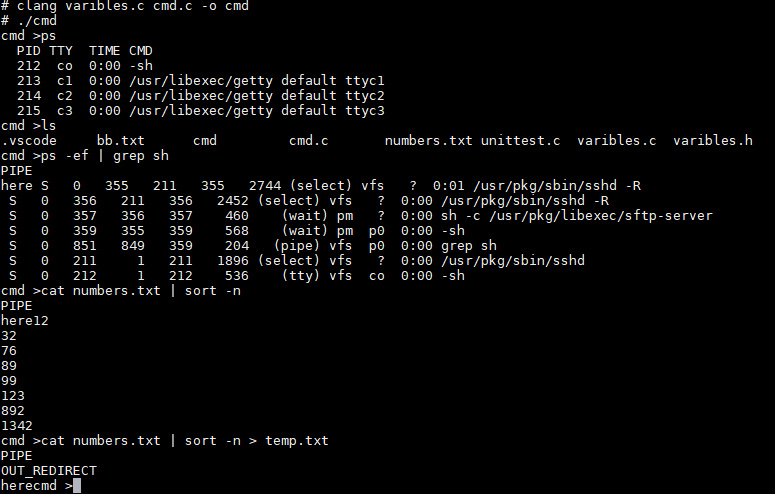本篇主要介绍多管道实现,自己也写得不好,希望大家多多指点。
思路
我在这篇文章中较详细的讲解了管道的实现,但当时只涉及到一个管道,因此只需要关心对管道的read和write,并不需要关心read到什么地方去。
首先,我们在使用pipe创建管道后,需要fork一个进程,子进程用于向管道写,父进程用于向管道读(注意,顺序不能颠倒)。很有趣的一个问题是,当我们使用fork命令时,子父进程的执行顺序是不能确定的,那么是让父进程向管道读还是子进程向管道读呢?
我的理解是,由于父进程不能先于子进程结束,而如果管道中没有东西,从管道读的操作会被堵塞,可以利用这个性质让子进程先于父进程结束。具体做法就是:让父进程向管道读,子进程向管道写。由于“向管道写”操作总是先于“向管道读”操作,因此可以做到父进程结束前回收子进程的工作。
那么,我们怎么做到多管道进行操作呢?其实也不难,我们可以先把所需要的所有管道建立好,然后当子进程要进行execv操作之前,把它的输出fd指向下一个管道的输入,这样重复进行就能实现多个管道进行通讯了。
要注意的是,当进行到最后一个命令,这时候我们需要判断:若最后一个命令就是“|”,则我们需要将管道中的数据输出到屏幕即可;若最后一个命令时">",则需要将管道中的命令写入对应的文件中。
实现
总体来说对于管道的操作有三种情况:
- 最开始有“<”重定向符号,接着有多个管道。
- 一开始就是多个管道进行传输,最后输出到屏幕。
- 通过多个管道传输后,最后重定向到指定文件。
其实这三种情况都可以写成一个函数,因为只需要对第一个命令和最后一个命令进行特殊处理即可。由于笔者很蠢,最开始没想到第一种情况,因此后面只能用修改字符串的方法曲线救国了,代码很丑,将就看吧。 pipe_command:
/*take care of pipe*/
void pipe_command() {
/*pointerindex is the index of each Command*/
int i = 1, j = 0, pointerindex[20], commandnumber = CommandInfo.index;
int pipenumber = 0, pid, pipefd[20][2];
char** P_temp;
pointerindex[0] = 0; /*the first command location*/
/*get all command's index*/
while (i <= commandnumber) {
if (CommandInfo.argv[j] == NULL) {
pointerindex[i] = j + 1;
i++;
}
j++;
}
/*if the last command is > or >>*/
for (i = 0; i <= CommandInfo.index; i++) {
if (CommandInfo.type[i] == PIPE)
pipenumber++;
}
/*init the pipe*/
for (i = 0; i < 20; i++)
pipe(pipefd[i]);
i = 1;
if (fork() != 0) {
/*this is the father, need to read*/
dup2(pipefd[0][0], 0);
close(pipefd[0][1]);
P_temp = CommandInfo.argv + pointerindex[1];
/*fork a process*/
pid = fork();
if (pid != 0) {
/*this is the father,wait child return*/
waitpid(pid, NULL, 0);
close(pipefd[1][1]); /*no need to write*/
next_pipe(pipefd, pipenumber - 1, pointerindex);
} else {
/*read the result from pipe and write to the next pipe*/
dup2(pipefd[1][1], 1);
close(pipefd[1][0]); /*no need to read*/
Execvp(P_temp[0], P_temp);
}
} else {
/*this is the child, need to write*/
dup2(pipefd[0][1], 1);
close(pipefd[0][0]);
Execvp(CommandInfo.argv[0], CommandInfo.argv);
}
}
对于多管道进行循环操作:
/*special run for mult-pipes*/
void next_pipe(int pipefd[20][2], int pipenumber, int pointerindex[]) {
char** P_temp;
char buffer[MAXLINE];
int commandnumber = CommandInfo.index; /*get the all command number*/
int i = 1, pid, fd, run_index = 2; /*refer to the index of command to run*/
int flag = !(pipenumber + 1 == commandnumber);
int lastCommand = 0;
/*if only one pipe and no other command, print it*/
if (commandnumber == 1) {
read(pipefd[1][0], buffer, MAXLINE);
printf("%s", buffer);
return;
}
/*loop to connect the pipe*/
while (pipenumber--) {
pid = fork();
if (pid == 0) {
/*this is the child, to run the command*/
dup2(pipefd[i][0], 0); /*read data*/
close(pipefd[i][1]); /*no need to write*/
dup2(pipefd[i + 1][1], 1); /*write to the next pipe*/
/*get the command*/
P_temp = CommandInfo.argv + pointerindex[run_index];
Execvp(P_temp[0], P_temp);
} else {
/*wait child completes the command*/
waitpid(pid, NULL, 0);
i++; /*next pipe*/
run_index++; /*next command*/
}
}
/*if the last command is > or >>*/
if (flag) {
if (CommandInfo.override)
lastCommand = CommandInfo.type[commandnumber];
else
lastCommand = CommandInfo.type[commandnumber - 1];
/*if the command is >*/
if (lastCommand == OUT_REDIRECT) {
fd = open(CommandInfo.argv[pointerindex[commandnumber]],
O_WRONLY | O_CREAT | O_TRUNC, 0666);
} else { /*the command is >>*/
fd = open(CommandInfo.argv[pointerindex[commandnumber]],
O_RDWR | O_APPEND, 0666);
}
read(pipefd[i][0], buffer, MAXLINE); /*read from pipe*/
write(fd, buffer, strlen(buffer)); /*write into file*/
} else {
read(pipefd[i][0], buffer, MAXLINE); /*read from pipe*/
fprintf(stdout,"%s", buffer); /*print into screen*/
}
return;
}
对第一种情况进行曲线救国:
void EditInfo() {
int i, location;
CommandInfo.index--;
/* find the first command -- NULL */
for (i = 1; i < CommandInfo.argc; i++) {
if (CommandInfo.argv[i] == NULL) {
location = i;
break;
}
}
/* override the used command*/
for (i = location; i < CommandInfo.argc; i++) {
CommandInfo.argv[i] = CommandInfo.argv[i + 2];
}
CommandInfo.override = 1;
}
结果展示

总结
至此,终于完成了一个简单Shell的实现。虽然实现中碰到了不少的问题,最后的代码也不够优美,但这次实验让自己认识到了不少的问题。
- C语言使用还不够熟练,特别是对于UNIX的各种系统调用。
- 没有想清楚了再动笔,代码组织结构有问题,模块化不够。
- 多文件的协调和编译还不够熟练,编译顺序?makefile文件?还不太会用。
- 很多小bug没有意识到,比如说直接输入回车,子父进程的管理和回收等等。
- 单元测试还不太会。
ToDo
虽然把project要求完成了,但前前后后改得面目全非,导致自己都不愿意再看代码了。先挖个坑,等有时间了再重新理理思路,定个小目标,用两百行左右代码写好。
参考资料
- [Linux shell的实现][1]
- Operating System:Design and Implementation,Third Edition
- Computer Systems: A Programmer's Perspective, 3/E